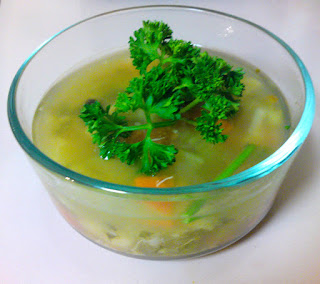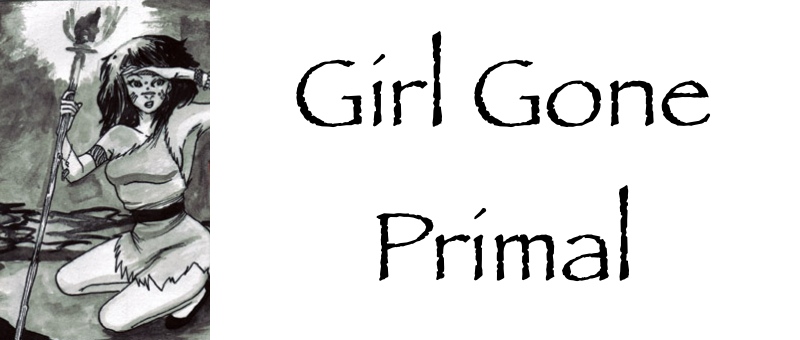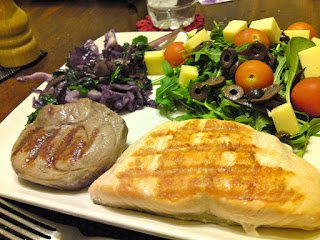After a crazy three days - four shows in fifty hours - the show has finally come to a tearful close and I'm left with time to dedicate to my eating, my blogging (reading and posting), and my marking. Forty-four essays await me upon my return to work tomorrow. Huzzah.
To help get me through it, I've whipped up a big batch of chicken and veggie soup - hello, Winter!

There may not actually be a way to make soup look sexy in a photo. At least, the ability escapes me and my sad little camera-phone.
Meanwhile, I - yet again - was unnecessarily snared into commenting on someone else's blog posts. She asked what others felt about low-carb diets, so naturally I had to lose an hour of my life to write this:
Congratulations on taking control over your eating habits and heading towards a healthier way of life! :)
Sugar and grains are addictive, so congrats again on making an effort to break that addiction. You've already received some great advice in the comments (as well as some majorly misinformed ideas, oh well), and I wanted to add my voice to the wall of support!
I'd encourage you to let go of thinking of yourself as following an 'eating program' and thinking more along the lines of changing to a healthier lifestyle. I spend my free time analysing health and nutrition studies, and am happy to share some of the well-founded science as well as some newly-proven information with you to help you on your way:
* Humans evolved to eat a diet based on land animals, fish, vegetation, eggs, and some fruit and nuts when found (occasionally - consider accessibility and seasonal availability). It has also been recently proposed that our genetic blueprint was 'finalised' around the time early humans discovered fire and were able to cook their meat and use tools - this is when our dental structure became flatter, as we had less need to tear into raw flesh with our hands and mouths.
* Many of our current health problems can be attributed to over-consumption of grains (wheat, rice, corn, etc) - consider how often you could find these plants in the wild, and consider the likelihood of consuming them raw... Studies have shown that eating grains prohibits our ability to grow secondary dentin to repair caries in our teeth - yes, humans can naturally fix dental cavities. Grains and sugar (another plant rarely found in the wild, and difficult to eat without being mechanically refined) also affect our insulin levels due to causing unnatural rises in blood sugar. Insulin affects our ability to metabolise fat, and triggers hunger sensations. I can go into that further if you'd like. You can also look up the work of Gary Taubes or Dr. Michael Eades - they are some great online options if you don't have the time or funds to access to published resources.
* There is absolutely no biological need for carbohydrates - complex or otherwise. All carbohydrates break down into glucose in the body, which our cells use for energy. However, our body can also use a form of glucose produced by the liver from protein. The body can also use ketones, a bi-product of dietary fat, as energy. The brain actually prefers ketones as its primary energy source, and can fulfill its need for glucose based on protein intake.
But if you don't want to wade through the science of nutrition and dietetics, just remember these points:
1. Eating fish as your core protein intake is fine, yum! If you could catch it in the wild, then go for it! It's good to note which species are sustainably farmed before you chow down though (if they lay many eggs - good; if they only lay a few - i.e. sharks - bad)
2. Eggs are one of the most nutritious and satiating foods in existence - enjoy! They are also one of the most versatile foods from a cooking perspective.
3. Eat as many vegetables as you can, and as many different kinds and colors as possible, to ensure you are getting a wide range of nutrients. Tubers (potatoes, etc) aren't great because they affect blood glucose and trigger insulin production, and they along with legumes aren't digested well by the body. Don't forget than peanuts are a legume, and corn is a grain.
4. Berries are the healthiest fruits, and have a lesser effect on blood glucose than most other fruits. Blueberries in particular have excellent nutritive properties.
5. Nuts promote satiety (feeling full) as they provide healthful fats (monounsaturated and saturated fat), so are helpful in small amounts.
6. Avoid all vegetable oils and other forms of poly-unsaturated fats. Omega-6 essential fatty acids should be balanced 1:1 with omega-3 fatty acids (fish oils, etc). Many health woes are firmly linked to the introduction of large amounts of polyunsaturated and trans fats into the human diet.
7. If it was made by chemists or machines, don't eat it. Try to stick to foods as found in nature - whole foods.
8. Dairy is a grey area - if your body responds well to lactose, try to go for raw milk/cream, and always full fat (low-fat dairy products are full of unnatural fillers and chemicals, and often sugar!). If you don't like full-fat milk, just add water - that's what the companies that sell 'skim milk' do anyway.
Ultimately, the human body evolved to consume a 'low carb' diet - eating refined grains and sugars is completely unnatural, and unprocessed grains are either inedible when raw, or cause health problems (such as restricting dental regrowth, etc). Once you break your addiction to sugars and grains, you will feel the difference in mental clarity, cardio-vascular fitness (regardless of activity level), organ function (including skin health) and sleep quality. Enjoy!
Still refining the art of simplifying the scientific findings I've been consolidating - what do you think?
Topped off the day with a delicious feast of primal dessert goodness:




































 I cut out grains, sugar and starches at the beginning of 2009. I have been keeping a journal as I have progressively shed my bulges and my processed foods. I am aiming to live a clean, primal lifestyle, and I wish to share my eating habits with those who wish to clean up their lifestyle and live happily and healthfully. As the cliche states - if I can do it, so can everybody else.
I cut out grains, sugar and starches at the beginning of 2009. I have been keeping a journal as I have progressively shed my bulges and my processed foods. I am aiming to live a clean, primal lifestyle, and I wish to share my eating habits with those who wish to clean up their lifestyle and live happily and healthfully. As the cliche states - if I can do it, so can everybody else.